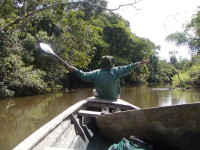
In recent years
there have been at least 42 evidences of the existence in
Brazil of "isolated Indians", according the
Socio-Environmental Institute website in
Brazil (www.socioambiental.org).
Photo. An Indian living in the Amazon - the Brazilian side - playing
on an instrument © Photo Copyright - Per Henriksen, Reiseliv - www.Reiseliv.no - one of our
freelance journalists and an great adventurer from Norway.
These are the Indians who the organ of the
Federal Government in charge of Indian affairs, the Fundação Nacional does Índio
- National Foundation for the Indian - Funai has not been in contact with. No
one knows for sure who they are, where they are, how many they are and what
languages they speak.
The little that
is known about them. One thing is that 25 of those evidences have occurred
within Indigenous Lands that have already been demarcated or have some degree of
recognition by Federal organs. Of the 42 evidences, the organisation Funai has
already confirmed 12.
|
Advertise |
Ready for an
adventure in Amazon - Brazil?
Company: AE River Boat Tours Ltd
Address: Rua Visconde de Piraja
336/Apt.402, Ipanema, Rio de Janeiro, Brazil
Phone Office: +55 (21)
2267-3552/2247-1270
Fax: +55 (21) 2267-3552
Website: www.amazonasexpeditions.com
E-mail:
mail@amazonasexpeditions.com |
The demarcation
is intended to guarantee the Indians` right for the land. It should establish
the real extension of the area under Indian possession, assuring the protection
of the demarcated limits and keeping invaders away.
According to the
estimates provided by many scientists, anthropologists, demographers or health
people, most part of the indigenous peoples has been growing, on average, 3,5%
per year, much more than the average of 1,6% estimated to the period from 1996
to year 2000 for the Brazilian population in general.
Yanomamiene
who live in the northern part of Brazil, on
the border to Venezuela,
count 14,000 Indians. They live in several small villages, and live in an area
big as Portugal.
The extensive jungle area in Brazil,
especially in the Amazon, makes it possible to find more uncontacted tribes.
Stein Morten Lund, 7 March 2004
Additional
information
Read more about uncontacted Indians in the Amazon
jungle on the Socio-Environmental Institute website: www.socioambiental.org.
Instituto Socioambiental (ISA) is a private
institution, qualified as Organização da Sociedade Civil de Interesse Público
(Oscip), since 21 September 2001, established to propose integrated solutions to
social and environmental issues. ISA's main objective is to defend the social
good and rights, both collective and diffuse, relating to the environment,
cultural heritage, human rights and the peoples.
